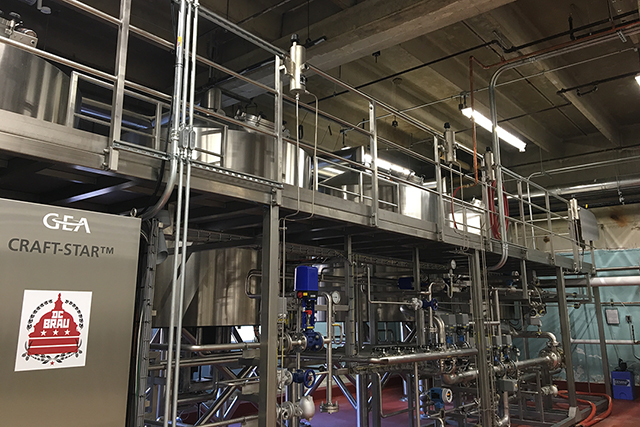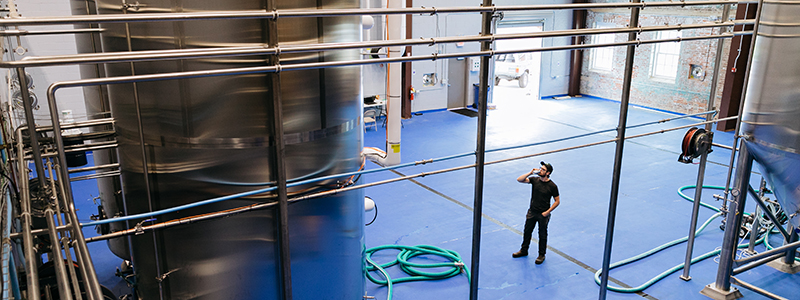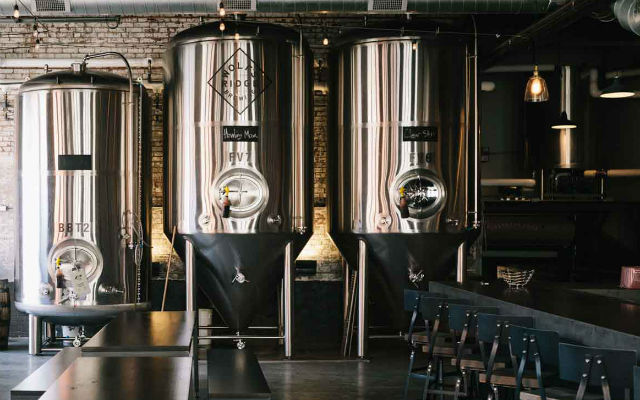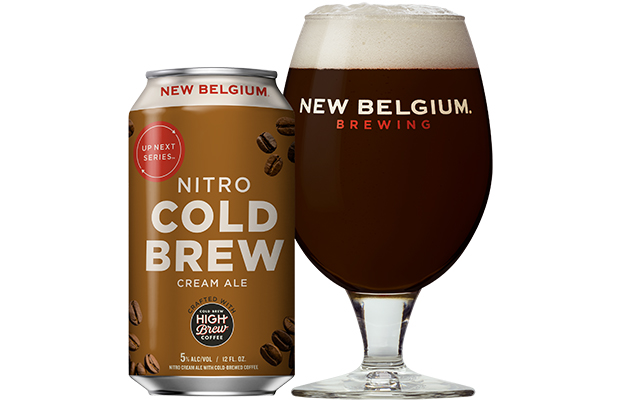
When upgrading, or even starting a new brewhouse it’s fairly obvious what some of the up-front costs will entail. The first thought goes to stainless steel: kettles, fermenters and such. But there are little hidden costs that need to be sorted through as well.
“In terms of up-front costs, it’s pretty obvious that bigger, more vessels, more automation and general sophistication will cost more,” said Creature Comforts Brewmaster Adam Beauchamp. “Chinese is generally cheaper than American or Canadian which is generally cheaper than German, but in my opinion you get what you pay for.
“Shipping costs can also be a major factor, with greater distances adding up quite a lot. There are also tariffs to consider when purchasing from some foreign countries, as well as currency exchange rates.”
Based on DC Brau’s recent upgrade to a 95-percent automated, 4-vessel 40 hl GEA Craft-Star brewhouse, brewery co-founder/president and Brewmaster Jeff Hancock said the largest recurring expense would be keeping replacement parts on hand for the brewhouse and other systems that support it.
“That figure is roughly $20-50,000 annually,” he said.
Second to those expenses would be the various trades and techs from the brewhouse manufacturer that his team corresponds with on a regular, recurring basis.
“The more expensive the equipment, the more expensive the maintenance and capital needed to fix those issues that arise,” Hancock said.
Brewhouses don’t tend to be as burdensome on the maintenance department as other equipment, like packaging lines, but there are still a fair amount of preventative and reactive maintenance to be performed, Beauchamp explained.
“Depending on the type of pumps you buy, you may be replacing seals often, which costs a couple hundred dollars each time,” Hancock noted. “Soft parts like gaskets and valve seats should be replaced periodically. If you have grease points that need greasing or gear boxes that need oil changes those things are important, but not very costly.”
Taking apart the heat exchanger for inspection and gasket replacement should be done probably at least once a year, he added.
The biggest drain for Yee-Haw Brewing has been pump maintenance and replacement.
“Getting a couple of seal kits to replace bad ones is no big deal, however, when you have back plates blowing out, or windings that fail, then you have a whole different issue on your hands,” said Brewmaster Cris Ellenbecker. “Over time these things are bound to happen.”
Added Beauchamp: “It’s a pain and the gaskets themselves have a little cost associated.”
Things like flow meters, temperature sensors, prox switches, level sensors and such will go out from time to time as well, Beauchamp said.
“If you have a highly automated system it can be pretty troubling when those go down, so the cost of stocking lots of extras can add up very quickly,” he said. “New brewing equipment should come with a minimum of a one-year warranty for all manufacturer defects.”
Barrio Brewing owner Dennis Arnold has been in the beer business for nearly three decades now and has overseen the completion of three brewhouses and understands that there are costs that many starting breweries don’t think about right away. Sometimes it comes down to space concerns or they are cost prohibitive at the start.
Just this year, Barrio — which opened in 1991 under the name Gentle Bens — added a mashout pump. Although it doesn’t make the task faster, it is safer and it gained the brewhouse 600 square feet of space, which Arnold said was much needed.
“Without having to drive a forklift through the back of the brewery with a mash dumpster we no longer have to keep that path clear so it can be used for canning and such,” he explained. “So it was like getting new real estate for $25 per square foot.”
Arnold built his first brewhouse in Tijuana because it was cheap and got him into business. Once Gentle Bens/Barrio made some money he bought a proper 15-barrel brewhouse in 1995 and changed to steam from direct fire. In 2012 Barrio moved up in size and number of vessels and capacity potential. In those six years they have grown 600 percent.
Arnold added that steam-heated brewhouses are solid pieces of equipment that if cared for will last 30-plus years.
“They potentially could last twice that if one thing is done perfectly, and that’s water chemistry of the boiler,” he said. “If that’s done to exact specifications then all other maintenance is super simple like door gaskets and such.”
Investing in human capital is just as important. A skilled repair tradesman can help save money and time.
Since opening in 2014, Creature Comforts has had a maintenance engineer, but Beauchamp added that brewers should also be able to diagnose and fix a lot of things.
“Our Head Brewer does a lot of maintenance as well,” he pointed out. “Our local electrician seems to always be here working on various projects, and he gets roped into any electrical problems that arise.”
The brew team is able to handle anything on the brewery’s 30-barrel, which has limited automation. With a new fully-automated system, Beauchamp said they get a lot of support from the manufacturer.
“We’re still learning the ins and outs of the software and honing our troubleshooting skills,” he said. “They stock a lot of parts in the US so we’re able to get replacements overnighted when we need them.”
Yee-Haw does as much as they can with who they have in house as well.
“There’s no one person that has the upper hand in the way of repairs,” Ellenbecker explained. “If we have a person that needs something to do we will put them on preventative maintenance ASAP.
“We are very fortunate to have the crew that we do, with all of them having such a great grasp for mechanical maintenance.”
When it comes to upgrades, many breweries tend to stick to the one that brought them into the dance if all has gone well, but with an influx of new vendors in the market, shopping around never hurts.
“I try to get three prices or quotes on any given piece of equipment we’re looking to purchase,” Hancock said. “Specific items like cylindro conical fermenters and brite tanks, I tend to not shop around as I already have manufacturers whose work I trust. That type of relationship and level of craftsmanship is invaluable.”
It seems that whenever Red Hare Brewing is in the market for something they usually reach out to the people they’ve done business with in the past said head brewer Bobby Thomas.
“But there has also been such a huge influx of new competitive businesses in this industry that we’re constantly finding new avenues to purchase the things we need,” he said. “It really depends on the level of need. Some things have to be here tomorrow. Other things we can wait until we find the deal of the century.
“Lots of shopping and contacts are made at CBC every year. Then we always meet new business relationships through local guild meetings and such.”
Hancock said that DC Brau does try to work with suppliers that they have a pre-existing relationship with.
“The craft beer industry has … become much more competitive and has allowed us to form new relationships with new suppliers and vendors based on our unique needs and deadlines for projects,” he explained. “At the end of the day, I’m happy to pay a little extra for quality equipment if my relationship is solid with a supplier.
“If something is wrong, I want to be able to reach a supplier that will work with me to resolve any issues that may arise. Most times when you save a lot of money on the front end, some suppliers don’t respond if there is an issue, which is the quickest way to piss off any brewery owner and operator. When I find vendors I trust, with proven records, I’m happy to recommend them to my industry peers and colleagues in an effort to reduce headaches down the road.”
Beauchamp made sure to add that Creature Comforts doesn’t go looking for “bargains.”
“We don’t buy cheap equipment, we don’t buy used equipment,” he said. “I’m not necessarily saying used equipment is a bad thing, it just hasn’t been a part of our calculus.
“The quality of our beer is the most important thing to me behind the well-being of our employees. Making sacrifices on equipment quality will lead to sacrifices in beer quality, which is something we are unwilling to do. Also, our vendors play a critical role for our company. They should be fairly compensated, but they should not make excessive profit.”
Photos courtesy Creature Comforts & DC Brau





4 Trackbacks / Pingbacks